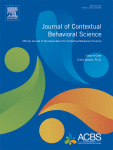2016 #3 Newsletter (October)
2016 #3 Newsletter (October)|
ACBS Newsletter - October 2016
|
|||
Newly Funded NIH Grants using ACT
We're excited to announce a pair of NIH funded grants on ACT for substance abuse related projects. Angela Stotts at the McGovern Medical School in Houston, TX, has received an R34 treatment development grant on Facilitating Treatment Entry and Family Planning in Substance-Using NICU Mothers, assessing the effects of a combined Motivational Interviewing-ACT program in reducing substance abuse and preventing future substance-exposed pregnancies in new mothers with at-risk infants. Secondly, Joy Schmitz, also at the McGovern Medical School, and Angela have received an R01 grant on Developing Adaptive Interventions for Cocaine Cessation and Relapse Prevention, evaluating the effects of combining ACT with contingency management procedures in promoting abstinence from cocaine and preventing relapse. Please join us in congratulating Angela and Joy on landing the grants! |
|||
ACT Case Conceptualization and Treatment Planning Webinar with Tim Gordon, MSWFor those of us that are new to therapy, formulating case conceptualizations within an ACT framework can feel like a daunting prospect. Fortunately, through the efforts of the ACBS Student SIG and Tim Gordon, we've posted a free webinar for ACBS members detailing the process of assessing a clinical case within the ACT model. The video provides an example case, and how a therapist might use an ACT conceptualization to inform their treatment. Beyond introducing viewers to the six core processes of ACT, the webinar also provides interesting insights regarding how the ACT model relates to other treatment approaches. If you're interested in watching this, or would like to see the other videos available, head on over to the Student SIG Webinar page. And for student ACBS members who are interested in getting connected with others, please visit the Student SIG page for information about the SIG and instructions on how to join! |
|||
Rule-Following and Twister
In ACT, we often urge our clients to be more flexible around the rules they create. But what about those cases when following rules can be helpful? In a study published in JCBS, Dixon, Speelman, Rowsey, and Belisle provided developmentally-disabled children with rules about the names of body parts using words that were and were not familiar to the children (e.g., "head is the same as noggin"). The children then played Twister, and were able to place the correct body part on the appropriate spaces with minimal training. This line of research has important implications on how RFT principles can be used to promote language training among developmentally disabled children. |
|||
New Publication Search FieldsSpeaking of publications, we've added some new and exciting functions to our publication database. In addition to the existing APA Citation and Keyword search fields, members can now specify the type of publication that they are looking for (e.g., books, journal articles, dissertations), as well as language! The latter function is especially exciting, as it speaks to the global growth and international presence of our community. In order to build out our database, we are interested in collecting more materials that may be relevant to our members: If you have an article to post (and especially if you have an article written in a non-English language), you can post it onto our website using the instructions found here. |
|||
2017 Annual Conference Call for Submissions - Opening 1 November
ACBS is happy to announce the the Call for Submissions for the ACBS World Conference 15 will open on 1 November. ACBS will proudly accept submssions in Spanish as well as English for the conference in Seville, Spain, June 20-25, 2017. |
|||
ACBS Website Hint of the MonthDo you have a question regarding a particularly difficult therapy case? Does learning about RFT make your mind want to explode? Are you looking for pointers or suggestions on a research project? Do you just feel like you're not as connected to the ACBS community as you'd like to be? Consider joining one of our e-mail listservs! The listservs are communities of like-minded individuals who are more than happy to "talk shop" about a broad number of topics, and are a great source of information. For instructions on how to join a listserv, please visit our listserv FAQ page. |
|||
Get Acquainted With ACBSDid you know that ACBS is the proud home to 1,928 student members? Student members are invited to join the ACBS Student SIG. This SIG is open to students in fields related to contextual behavioral science. |
|||
|
|||
| Connect. Share. Grow. |
See you at the Seville, Spain World Conference! To be held June 20-25, 2017. Go here for more information. |
 |
|
|
|
|||




